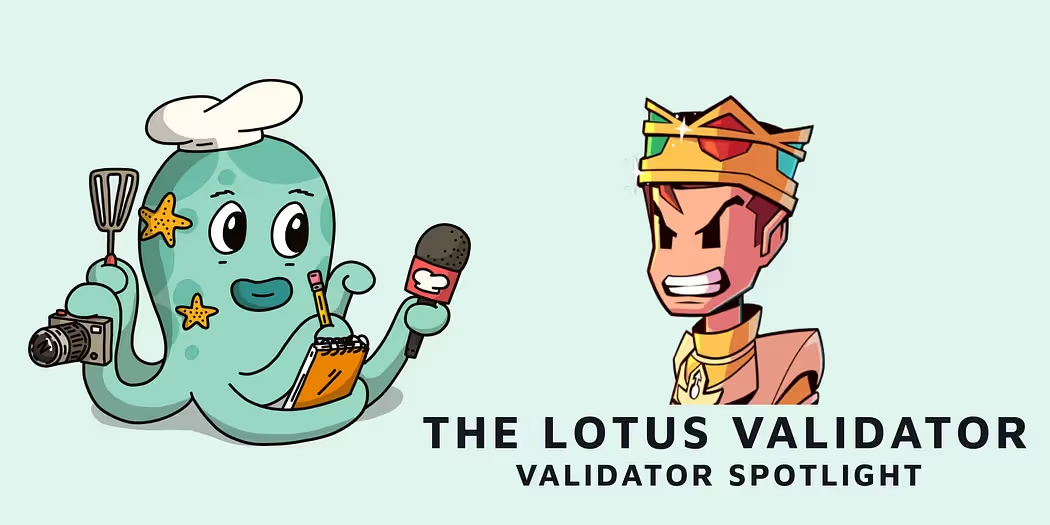Marinade’s Solana Validator Spotlight: Laine
What drives Solana’s prosperity as a leading, mass-adopted Layer-1 blockchain? Its novel Proof-of-History design that enables lightning fast transactions at an unmatched scale of 65,000 transactions per second.

Without a global network of validators running programs to provide consensus on these transactions, Solana cannot be the prosperous ecosystem it has grown into in such a short time. Over 1,500 validators around the world now process transactions and participate in consensus to fuel performance and censorship resistance for the blockchain.
Validators attract SOL from token holders (stake) and the more stake they receive, the more blocks they validate. Stakers are paid rewards from token emissions and validators earn a commission from those rewards for their service.
Prior to the launch of Marinade, a token holder would have to research individual validator accounts and delegate their stake to one. The introduction of the Marinade liquid staking pool helped streamline this process for the staker. SOL holders could now stake to the Marinade stake pool which then automatically delegated their position to a wide network of validators. When the staker unstakes their SOL from Marinade they receive their competitive staking rewards of 6+% APY.
Marinade stake pool’s strategy at present delegates to over 400 validators who meet the requirements to receive part of the stake pool. Staking with Marinade then allows SOL holders to receive mSOL in return that enables them to use the token to participate in Solana DeFi.
None of this is possible without validators. So what is it like to be a key, if unsung, piece in the Solana ecosystem?
Meet Laine, a Solana Validator
Meet Laine, whose real name is Michael. He runs a software development company in Cape Town, South Africa. Laine first got into crypto in 2013 having discovered Bitcoin. In 2017, he took the leap into Bitcoin mining. But it wasn’t long until the 2018 Crypto Winter arrived and Bitcoin plunged.
“I got burned and stepped away from the space for a few years,” he recalled. Eventually the advances within crypto and new blockchains piqued his interest once again.
“I heard about Solana and really liked what they were doing.” “I always thought if crypto was supposed to be a currency, it needed fast transactions.”
So in 2021, Laine dove back into crypto and specifically the Solana community, engaging in various Discord and Github communities and liked the engagement and progress among developers.
Since Laine walked away from Bitcoin mining, it’s become intensely competitive and even bigger business. Entire companies are being formed to mine blocks in Bitcoin’s Proof-of-work blockchain. So it was refreshing when he discovered Solana and its Proof-of-history method of validating blocks. He learned that while validating PoH transactions still requires technical expertise, it was far more entrepreneurial and extremely less energy intensive compared to Bitcoin.
The Solana Foundation has a validator program you can join to help get you started, but there is a waitlist and by August Laine was ready to go it alone. He had to rent data servers (data is cost-prohibitive in South Africa due mainly to its remoteness to the greater internet).
“With Bitcoin it’s more of a hardware game,” said Laine. “You have these ASIC little boxes and they make a hell of a noise and use a lot of electricity. The focus is on keeping the machines running and dealing with dust, humidity, power draw and not tripping circuits.
“Whereas with Solana it’s one server. Once it’s set up well, it’s pretty stable, and then it’s largely about marketing.”
To attract stake, validators can perform a wide variety of promotional methods. Laine has a website with a staking FAQ and link to his public validator key. He also built a tool for Solana users at stakewiz.com. Here, Laine created a WizScore that aggregates over a dozen data points to grade validators on their good behavior and commitment to decentralization. The idea behind Stakewiz was to educate and also spotlight smaller, well-behaving validators worthy of receiving stake and thus helping raise Solana’s censorship resistance.
Laine also has their own Discord channel and engages in other channels such as Marinade’s and comments on validator items on Reddit and Twitter. In total, Laine estimates the time spent on the validator business amounts to a few hours per day though some days are committed entirely to validator items.
“It’s really about getting your name in front of as many people as possible.”
Once running and optimized he soon began receiving stake, including from Marinade’s stake pool, which avoids the super-minority and instead delegates stake to the “long tail” of smaller validators like Laine. Within 2.5 months he had broken even his initial investment. Not even a year later, when Marinade caught up with Laine he was sitting at 985,000 SOL staked, tantalizingly close to that 1 million SOL mark.
The creation of liquid staking by Marinade has played a big part in continuing to attract more SOL holders to move their funds off cold wallets or a CEX and instead earn staking rewards and explore Solana DeFi opportunities.
“It really opens up the options from a yield perspective. Regular staking feels boring and static. Ensuring that SOL is still staked is important for network security. If you didn’t have [liquid staking] you’d probably see an exodus from staking. Those users would rather go into DeFi.”
Outlook for Solana decentralization and validators
Today, Solana growth continues its acceleration by onboarding new users while new projects are proliferating. The validator community’s economies are also evolving. From Laine’s perspective, he reports that validator restart times, a scary time for Validators as their accounts are shown as delinquent while they are offline, have improved on Solana since last fall when downtime could drag on.
One of Marinade’s key goals for 2022 is to elevate Solana’s Nakamoto Coefficient from 19 to 50. This can be achieved firstly through proliferation of the mSOL token. As more SOL holders stake thru Marinade and receive mSOL in return, the TVL the Nakamoto Coefficient is poised to rise thanks to the Marinade stake pool’s decentralizing formula.
There are obstacles to achieving this goal, however. The backlog for the Solana Foundation to onboard new validators continues to get longer and startup costs (about 5,000 SOL or $410,000+ self-staked or approximately 50,000 SOL staked by users) are discouraging new validators from coming online and further strengthening Solana.
He still sees the startup costs to run a validator and the backlog via the Solana Foundation as areas to improve. The biggest challenge for the time being will come from efforts geared towards some of the original staked SOL, currently staked with the largest accounts, and getting them dispersed to a wider network of validators. Causing additional complexity, some of these whale accounts are staking their SOL to their own validator and earning the fees.
“To increase the super-minority,” said Laine. “We’re going to have to see a lot of the big whales that got SOL early to start distributing stake to more validators.”
Marinade has been focused on this issue and Chefs from the DAO recently introduced a new proposal in the forum that would adjust Marinade’s current stake pool delegation strategy by enabling MNDE token holders to delegate their stake to eligible validators outside the “super-minority.” The theory behind the proposal is this could help enable more competition among validators through incentives and reduce the amount of marketing required to attract stake. Laine is among the first to comment on the proposal.
The long-term success of Solana is reliant on attracting more validators. And even though more competition would presumably mean more competition for stake, validators like Laine are nevertheless eager for it.
“In the long run,” said Laine. “It’s better for Solana and better for every validator.”
Participate in the Solana Validator Community!
Marinade values the insights of validators and uses the collaboration to guide the future of the DAO in order to ensure a prosperous future for all participants in Solana. You can join the Marinade Discord and visit the #validators channel. you are also invited to visit the Marinade Forum and provide your feedback on the validator proposal and other DAO items.
About Marinade
Marinade.Finance is the first non-custodial liquid staking protocol built on Solana. Stake your SOL tokens with Marinade and receive mSOL (“marinated SOL”) tokens in return that can be used in decentralized finance (DeFi). mSOL is the most widely integrated collateralized version of SOL. The price of mSOL goes up relative to SOL each epoch, with rewards being accrued into your stake account.
Marinade’s delegation strategy stakes to 400+ validators that are selected automatically by an open-source, fair formula based on performance, commission, and decentralization.
Marinade includes mSOL->SOL swap, so you can “Unstake Now” and receive your SOL immediately for a small fee. You can also directly exchange between mSOL and SOL on secondary markets at the current rate. Finally, you can unstake your SOL with zero fee by waiting 2–3 days for the Solana cool-down period (Delayed Unstake).


